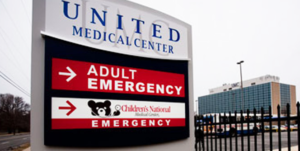Washington, D.C.’s Wards 7 and 8 were left in need of maternity care centers after two D.C. birthing wards servicing the area closed late last year.
Well-known in the D.C. area for serving individuals in need as it accepted patients without regard for their legal status or ability to pay, Providence Hospital set affordable rates and offered charity to the District’s poorest. The hospital, located in the northeast D.C. neighborhood of Michigan Park, closed its birthing ward Oct. 16.
Now that D.C.’s only public, not-for-profit hospital, United Medical Care — which presides over Southeast Washington — closed its birthing ward after a December board vote, no labor and delivery services remain operational in Washington’s eastern half.

UMC has made arrangements with Howard University Hospital and Unity Healthcare to provide prenatal care at community clinics in Wards 7 and 8.
UMC has made arrangements with Howard University Hospital and Unity Healthcare to provide prenatal care at community clinics in Wards 7 and 8. Additionally, the UMC news release asserted that other D.C. hospitals are well below capacity and should be able to provide care to affected mothers.
UMC originally closed its birthing ward in August after the D.C. Department of Health Services found deficiencies in the quality of care provided there. On Dec. 14, UMC announced that they would not seek to renew their obstetrical services license.
Although these two closures are not related, they exacerbate the dearth of prenatal and natal care that had already existed in the D.C. area.
Aza Nedhari, founder of Mamatoto Village, a D.C. nonprofit group that works with low-income women, fears that sending these mothers to other hospitals could overwhelm the birthing wards..
Even if other D.C. hospitals like MedStar Washington Hospital Center and The George Washington University Hospital can accommodate the influx of mothers, Ward 7 and 8 mothers will face yet another hurdle as they struggle to coordinate their prenatal care from community clinics with their deliveries at a hospital, according to Nedhari.
“What I feel is going to end up happening is when you increase capacity you diminish quality,” Nedhari told The Washington Post Oct. 28.
Even if many mothers deliver children through the emergency ward, they will likely need prenatal care from an obstetrics ward prior to giving birth, according to Melissa Fries, chairman of Women’s and Infants’ Services at Washington National Hospital Center
“The biggest risk factor for infant and maternal mortality is a lack of prenatal and obstetric care,” Fries told The Washington Post on Jan. 16.
However, the location change still presents a strain to Ward 7 and 8 mothers, and there is concern that larger institutions in the city will be unable to absorb the added patients.
Additionally, many of the mothers in Wards 7 and 8 are members of minority groups, whose pregnancies have an infant mortality rate that averages 8.2 per 1000 births, compared to 1.7 per 1000 among white mothers, according to the U.S. Department of Health and Human Services.
The UMC Board reviewed several options before ultimately deciding to keep their birthing ward closed. Alternatives included reopening the ward with the same services as before after addressing the DHS’s concerns and reopening the ward under a new, better-staffed policy.
A Dec. 16 press release from UMC stated that the decision and leaves room to revisit implementing the new policy later “due to the investments of time, management, and resources that would be needed for such an approach to be successful.”
According to UMC, most mothers deliver through the emergency ward.
UMC holds that their ward failed previously because of the low volume of patients, which made it challenging to provide proper care and staffing to the ward said UMC Board Chair Ruby LeMay.
“We remain committed to the residents and patients of this community. The unfortunate reality about OB is this: long before the DOH decision to restrict OB, mothers made a conscious choice not to deliver their babies at United Medical Center,” LeMay wrote in a Dec. 16 news release.
According to LeMay, UMC will be assisting with this changeover process.
“We will work with the DOH through this transition period and look forward to doubling down our efforts to deliver high-quality in all the other services that we offer at United Medical Center,” LeMay said.




















